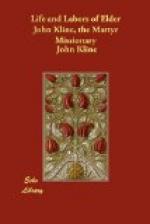FRIDAY, April 20. On this day Brother Kline, in company with Brother Benjamin Bowman, started on a journey to some of the western counties of Virginia, now West Virginia. The first day they got to the widow Miller’s, on Briery Branch, in the southwest corner of Rockingham County. The next day they went through North River Gap and got to Henry Sanger’s, in Highland County, Virginia, where they had night meeting. Here Brother Bowman delivered a discourse, which, according to the outlines in the Diary, was so pregnant with original thought characteristic of the man that I will endeavor to expand its contracted form and give it a more readable shape. TEXT.—“Then said Jesus to those Jews which believed on him: If ye continue in my word, then are ye my disciples indeed; and ye shall know the truth, and the truth shall make you free.”
There was great diversity of feeling among the Jews in Christ’s day, just as there is among Gentiles now. Some were flint; others, clay in the hand of the potter. “The common people heard him gladly; but the scribes and Pharisees resisted the counsel of God against themselves.” If we read the entire chapter carefully it will give us a more impressive view of and a clearer insight into the stubborn hardness of the Jewish heart than any other single chapter that I can now think of. The Jews were so wedded to their worldly sanctuary, so in love with the representative forms of worship, that they could receive no just ideas of genuine spiritual worship. Let me draw a comparison here. Many people seem to think themselves rich when they have plenty of money either in hand or standing out on interest. They think so from the fact that money represents every exchangeable commodity of worldly goods. In it they behold the supply of every bodily want, the service they need and the honor they crave.
This is something like what the scribes and Pharisees, the elders and priests saw in their religion. And these worldly emoluments and benefits are what they feared would be taken away from them, should the great principles of love to God and love to man, inculcated by our Savior, be generally received. They said: “If we let him thus alone, all men will believe on him; and the Romans will come and take away both our place and our nation.”
The Roman power had a civil regard for the temple so long as it retained its dignity as the national house of Jewish worship. Should it, however, lose this honor by being no longer needed and used as such, the Romans would withhold this regard and convert it—as was actually done years afterward—into a barrack for soldiers. Where would then be the salaried scribe, the domineering and overbearing elder, the rich but hypocritical Pharisee, and the pompous high priest? Their place and their nation would be gone. These considerations, in connection with their inbred conceits that they were the peculiar, chosen and exclusive people of God, caused them to




